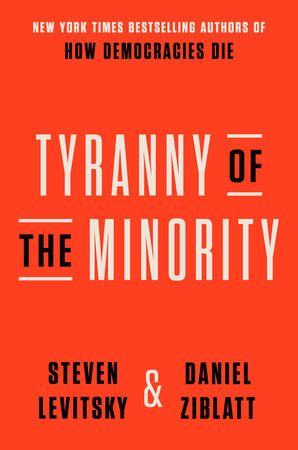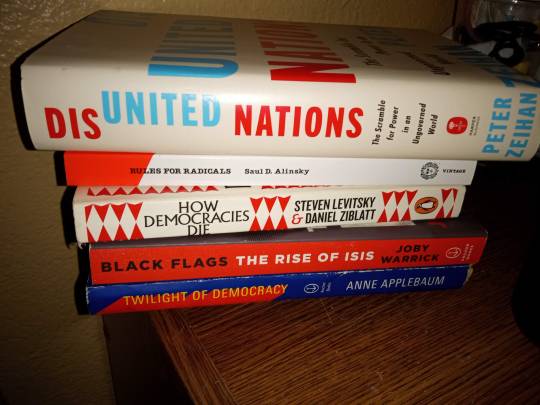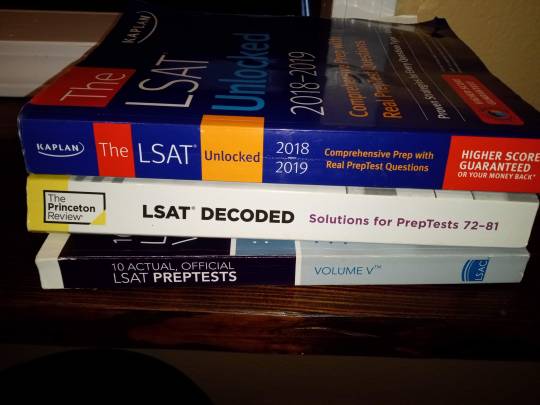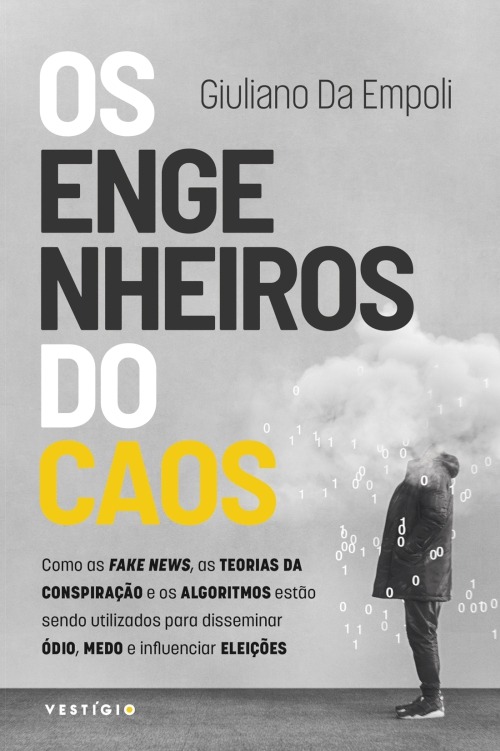#Steven Levitsky
Text


#GOP#quote#Steven Levitsky#John Barrasso#John Cornyn#Lindsey Graham#Bill Cassidy#John Thune#Mitch McConnell
4K notes
·
View notes
Text
Steven Levitsky, political scientist and author of 'How Democracies Die', says it's crucial for Brazilian democracy for Jair Bolsonaro to be defeated in the first round of the country's presidential elections this year.
#brazil#politics#brazilian politics#democracy#brazilian elections#steven levitsky#brazilian elections 2022#mod nise da silveira
8 notes
·
View notes
Text
This is a thought-provoking interview and definitely worth the read, but the whole piece - and especially this part - made me feel like I was watching the conversation from the other side of a soundproof window, just banging away with my fists.
I don’t understand how you approach a conversation about encroaching fascism in the US in 2024 (or 2023 or 2022) without even mentioning the LGBT community given that every one of those years has seen a record number of bills introduced in state legislatures to curtail the rights of queer - and especially trans - people.
It’s not even ahistorical - queer and trans people were also specifically targeted by the Nazis.
We really are that invisible.
#this is my brain on life#us politics#elder queers#midwestern queers#anti trans bills#Steven Levitsky
0 notes
Text
Tune-up or Rebuild the Machinery of Government
A few years into the Trump presidency, two Harvard University professors of government, Steven Levitsky and Daniel Ziblatt wrote How Democracies Die. The book was a best-seller, calling out the decline in tolerance and respect across political party divides. The pair followed that effort in 2023 with Tyranny of the Minority. Equally popular, this volume highlights historical crises to make…

View On WordPress
0 notes
Text
0 notes
Text
A Republic -- If You Can Keep It
Legend has it a woman asked Benjamin Franklin a question as he exited Independence Hall after the Constitutional Convention in 1787. “Doctor, what have we got? A republic or a monarchy?” Franklin supposedly replied, “A republic, if you can keep it.”
As I’ve expressed before, I keep looking around at what’s happening in this country, both in our government and among our society, and I’m not liking…

View On WordPress
#current state of the nation#Daniel Ziblatt#How Democracies Die#social intolerance#Steven Levitsky#U.S. Constitution#violence becoming the norm
0 notes
Text
The 6 January Congressional Committee Report: Democracy Discarded
The 6 January Committee has released its summary of a report. It should alarm us all. It should light a new fire of urgency to hold Trump et al. accountable before the 2024 elections. Will it?
The 6 January Committee, Trump, and the Risk to Our Democracy that White People Perceive
Now that the 6 January Congressional Committee’s introduction to its final report is out and being dissected by all the punditing pundits and head talking talking heads — it will soon be a double header with the actual report being published tomorrow (if I publish in time, big if, right?) — we should…

View On WordPress
#6 January Committee Hearings#6 January Insurrection#Coup#Daniel Ziblatt#Democracy#Democratic Institutions#Insurrection#Karen Stenner#Pundits#Steven Levitsky#Terri Kanefield
0 notes
Text

A warning from Harvard Professor Steven Levitsky
160 notes
·
View notes
Text
Elise Stefanik is no genius.
19 notes
·
View notes
Text
2024 Reading List 📚


Here is my reading list for 2024 and all the books I plan to get to that are not for school. Sorry for how non aesthetic the pictures look.
Dis United Nations by Peter Zeihan.
Rules for Radicals by Saul Alinsky.
How Democracies Die by Steven Levitsky and Daniel Ziblatt.
The Rise of ISIS by Joby Warrick.
Twilight of Democracy by Anne Applebaum.
Soft Power by Joesph S Nye Jr (eBook).
I'd like to try to read more novels this year, but I don't currently have any in mind right now. However, I used to be really into Ernest Hemingway and Jane Austen, so maybe I will reread some favorites of mine.
These are also the books I plan to use for the LSAT.


Not pictured:
Lawhub tests | Khan Academy Prep | 7Sage LSAT Prep
I'm also trying to expand my vocabulary with GRE prep. Moreover, I also want to start doing word puzzles and sudoku regularly.
#studyinspo#study blog#grad student#studying#lsat#lsat prep#reading#reading list#2024#studyspo#study motivation#studyblr#study aesthetic#student life
6 notes
·
View notes
Text
10 notes
·
View notes
Note
do you have any book recs? i’m trying to find ways to fill my free time that isn’t scrolling around on my phone 😭
i'm not sure if i'm the best person to ask for book recs, anon. my tastes are not wide by any means and i'm not really a critical reader, but i tried to list some books i enjoyed here (there are many more but i went with the ones i can remember at the top of my head):
FICTION
(organized by author)
Agatha Christie: If you're looking for comfort murder mysteries, there is no better author. My favorite is the Miss Marple series, where a gossip-loving and extremely sharp old woman solves murder mysteries.
Richard Castle: Yes, these are the Nikki Heat books from the show Castle. They're quite well written, and even more fun to read if you're familiar with the characters of the show.
Tess Gerritsen: These are more intense murder mysteries than the ones listed above, and slightly more forensic. My favorite series is the Rizzoli and Isles series, which is the inspiration for the TV show of the same name.
Nora Roberts: Still some of the best romance I've read, honestly. After reading about 50 of her books, I can confidently say that her characters fall in fixed molds and the storylines are very predictable. It's still very good. It's comforting. You can read a bunch of them in a day to destress. Some series I like are: Inn Boonsboro, The Calhouns.
NON-FICTION
(organised by theme)
Threats to Democracy: How Democracies Die by Steven Levitsky, Fascism by Madeline Albright, Twilight of Democracy by Anne Applebaum
Autobiographies: James Herriot (I cannot recommend this enough), Trevor Noah
Historical: The Great Influenza by John M. Barry, To Start a War by Robert Draper (this made me angrier than I thought was possible by a book)
Government Institutions: The Premonition by Michael Lewis, The Fifth Risk by Michael Lewis
Feminism: Hood Feminism by Mikki Kendall, We Should All Be Feminists by Chimamanda Ngozi Adichie
Government Intelligence Agencies: Mossad by Michael Bar-Zohar and Nissim Mishal
#as you can see i've focused on easy readings for fiction#there are obviously entire genres im leaving out#i like a lot of other stuff as well in fiction mkgjrk just cant be bothered to write a proper thing for woolf or austen or premchand#asks#anon#book recs
7 notes
·
View notes
Text
The Democrats controlled the House of Representatives for about sixty years, with only brief interruptions in the mid-to late twentieth century, but their dominance ended in 1994, when the Republicans swept to victory under Newt Gingrich, who became Speaker of the House. Gingrich then imposed a set of reforms intended to discourage his many new members from forging the sort of personal relationships across party lines that had been normal in previous decades. For example, Gingrich changed the work schedule to ensure that all business was done midweek, and then he encouraged his members not to move their families from their home districts, and instead fly to Washington for a few days each week. Gingrich wanted a more cohesive and combative Republican team, and he got it.
The more combative norms then filtered up to the Senate as well (though in weaker form). With control shifting back and forth several times since 1995, and with so much at stake with each shift, norms of civility and possibilities for bipartisanship have nearly disappeared. As political scientists Steven Levitsky and Daniel Ziblatt put it, “Parties [have] come to view each other not as legitimate rivals but as dangerous enemies. Losing ceases to be an accepted part of the political process and instead becomes a catastrophe.”
(...) to produce a very unfortunate change in the dynamics of American politics, which political scientists call negative partisanship. In a recent review of data on “affective polarization” (the degree to which members of each party feel negatively toward the other party), Iyengar and Krupenkin summarize the change like this: Prior to the era of polarization, ingroup favoritism, that is, partisans’ enthusiasm for their party or candidate, was the driving force behind political participation. More recently, however, it is hostility toward the out-party that makes people more inclined to participate.
In other words, Americans are now motivated to leave their couches to take part in political action not by love for their party’s candidate but by hatred of the other party’s candidate. Negative partisanship means that American politics is driven less by hope and more by the Untruth of Us Versus Them. “They” must be stopped, at all costs. This is an essential part of our story. Americans now bear such animosity toward one another that it’s almost as if many are holding up signs saying, “Please tell me something horrible about the other side, I’ll believe anything!” Americans are now easily exploitable, and a large network of profit-driven media sites, political entrepreneurs, and foreign intelligence agencies are taking advantage of this vulnerability.
2 notes
·
View notes
Text
Political scientist Karen Stenner explains it this way: As liberal democracy expands and includes more people, it becomes more diverse and complicated. The growing diversity and complexity trigger authoritarian reactions in people who are averse to diversity and cannot tolerate complexity.
This is particularly true when an increasingly diverse electorate threatens the power and status of the ethnic majority. Daniel Ziblatt and Steven Levitsky, Harvard political scientists, put it this way:
“It is difficult to find examples of societies in which shrinking ethnic majorities gave up their dominant status without a fight.” (How Democracies Die, p. 207.)
Members of the Republican Party who reject democracy are part of a movement that has been springing up worldwide, which we can call the “New Radical Right.” This movement has much in common with the fascist regimes of the 1930s. Hitler’s regime, recall, was partly a reaction to the growing diversity in cities like Berlin.
7 notes
·
View notes
Text
In their book How Democracies Die, Steven Levitsky and Daniel Ziblatt point out that one tool used to undermine democracy is the courts, and autocrats will pack the courts, appoint friendly judges, or amend laws to favor themselves such that they are never acting outside the law and each of their decisions is legally validated, but the consequence is an authoritarian state that ends democracy. This technique is used in authoritarian regimes across the globe and history.
8 notes
·
View notes
Text
Indicações de livros para te ajudar a escolher um candidato
Quando se fala em política, muita gente acaba se afastando e fugindo do tema. Porque?
Esse assunto costuma causar muitas discussões, brigas e desentendimentos entre as pessoas. Mas não precisa ser assim.
Por vivermos em uma sociedade democrática, o debate político e a troca de ideias, experiências e pensamentos são pontos fundamentais para o funcionamento da democracia.
Precisamos saber ouvir o posicionamento do outro com civilidade - a não ser que esse posicionamento fira ou atinja negativamente as minorias.
Independente da ideologia da pessoa, não podemos tolerar um posicionamento que não tolere o coletivo, exclua pessoas e defenda o extermínio de minorias.
Uma troca saudável de ideias acontece quando os dois lados pensam no coletivo, não no individual.
Pensando nisso, trouxe algumas recomendações de livros para conscientizar e mostrar o porque estamos vivendo tempos retrógrados.
Iniciaremos a lista com "Os Engenheiros do Caos" de Giuliano da Empoli.

Essa obra explora como e porquê líderes reacionários e de extrema direita ascenderam ao poder em 192 páginas.
A segunda recomendação é "O ódio Como Política" de Esther Solano.

Seguindo a mesma linha de raciocínio, essa obra de apenas 128 páginas foca em como o discurso de ódio levou a extrema direita ao poder.
Em terceiro, recomendo o livro "A Elite do Atraso" de Jessé Souza.

Em 272 páginas, o autor disserta sobre como os problemas que carregamos hoje tem grande influência da época escravocrata.
Quarta indicação é "Jornalismo Wando" de João Filho.

Focando mais na situação do Brasil, o livro mostra quem são as pessoas responsáveis pela ascensão do Bolsonarismo e como elas influenciam a população. 184 páginas de pura radiação!
O quinto livro que eu recomendo é "Como as Democracias Morrem" de Steven Levitsky e Daniel Ziblatt.

Em 272 páginas, os autores voltam ao período de Mussolini e Hitler e esmiuçam os passos que levaram democracias ao colapso, comparando com figuras e líderes atuais.
O sexto (e último) livro é, novamente, de Jessé Souza: "Brasil dos Humilhados".

Saindo um pouco do tema diretamente político, o autor deixa explícito a desigualdade do Brasil, abordando a submissão da elite intelectual para com a elite do dinheiro. 252 páginas de uma elite distorcendo tudo e invertendo os privilegiados com os oprimidos.
NOTA:
Os livros selecionados não vão agradar à todos e a minha intenção com esse post NÃO é essa.
Meu único objetivo foi trazer livros mais recentes possíveis que retratam o cenário político atual.
Independente da sua preferência e ideologia, as obras escolhidas a dedo explicam como chegamos até aqui e como a nossa democracia está ameaçada.
Me sigam nas redes sociais:
Instagram
TikTok
Contribua com financiamento coletivo
Livros, HQ's e Mangás que estou vendendo
Compre com o meu link na Amazon
#livro#livros#política#leitura#livraria#bookaholic#lendo#literatura#bookstagram#livronovo#booksofinstagram#livros e leitura#book#books#leitura nacional#autores nacionais#indicações#eleicoes2022#eleicao#democracia#mundo#presidente
4 notes
·
View notes